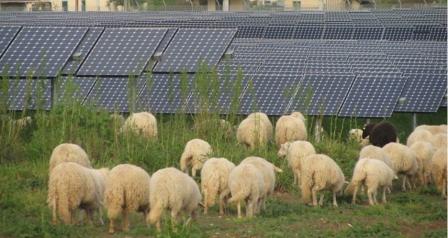 |
| photo from Business Cornwall website |
I couple of articles about solar power have come to my attention since writing: Solar Farms why the government should be investing. They both concern Cornwall directly, the first comes from Andrew Wallis (the Independent councillor and implacable critic of Cornwall Council) which raise doubts that the planned solar farm by Cornwall Council will have to be abandoned due to the funding review. Andrew's blog is here: Solar Farm Gold Rush Over. The funding review of the Feed in Tariff certainly was a kick in the teeth for the Conservative- Independent coalition at County Hall as they had a lot riding on the old preferential rate as an old press release for the council explains: Cornwall Council prepares for £1 billion solar power gold rush. As Councillor Wallis rightly points out any Solar Farms will have to be set up and plugged into the grid by the first of August, which is really not long and Cornwall Council face abandoning the scheme after lots of work.
Which brings me to the other article, which is a news item by local PR firm Deborah Clark Associates; Solar Companies Granted Judicial Review, which explains that lots of companies have combined together to challenge the government's policy in court. It must be said that whatever side of the argument you are on for or against subsidy, it is a very shabby way to do business by the government. Quite why companies and organisations such as Cornwall Council were not given ample time to finish planned solar farms is outrageous. For a government supposedly committed to encouraging business, attitudes like this raise serious questions.
Anyway I digress, will we have the solar farms in Cornwall and elsewhere? it seems a little early to tell whether the Judicial Review might be successful and grant firms an extension of the subsidy or force the government to reconsider the whole thing.
On the subject of solar farms I must say that I am not supportive of them without condition and I share the concerns of Andrew Wallis about using agricultural land. (I have the same concerns about large scale house building on green field sites in Cornwall). However, it should be noted however that the Wheal Jane site where the council plan to build the solar farm is not farmland and is a disused tin mine. In cases like this where the visual impact is lessened by hills, valleys and trees and the land is not fit for farming or much else, these would have been (or might be if the government sees sense) the most suitable sites for medium and large scale solar developments
Generally on the subject of supplying energy for the future, we have to ask ourselves would we rather live next to a wind farm or a solar farm or a nuclear power station or a coal fired power station?
Would we rather our energy came from dangerous nuclear plants and the associated problems of spent fuel rods and nuclear waste?
Will we continue to rely upon fossil fuels which are a finite resource with year on year rising costs?
On the subject of subsidies we might ask why the government is subsidising nuclear energy and not renewable energy, it's clear the subsidy is not the issue. The government favours nuclear power.

Good article. it is a shame having hundreds of the farms in Cornwall will not make electricity cheaper for the people of Cornwall.
ReplyDeleteIt’s a shame; this is meant to be the energy revolution of the future. The policy is basically denying us the right to economic advancement that Cornwall so badly needs. For once we could be able to talk about having an industry that isn’t tourism! I live in hope.
ReplyDelete@ Andrew thanks for the comment, it is indeed a shame that the people of Cornwall will gain no direct economic benefit for having any solar farms, that's a very interesting idea not sure how it might be implemented....
ReplyDelete@anon thanks for the comment, I share your frustration about the Cornish economy and the lack of any real substantial industry and the inability of the powers to be to facilitate any such development.